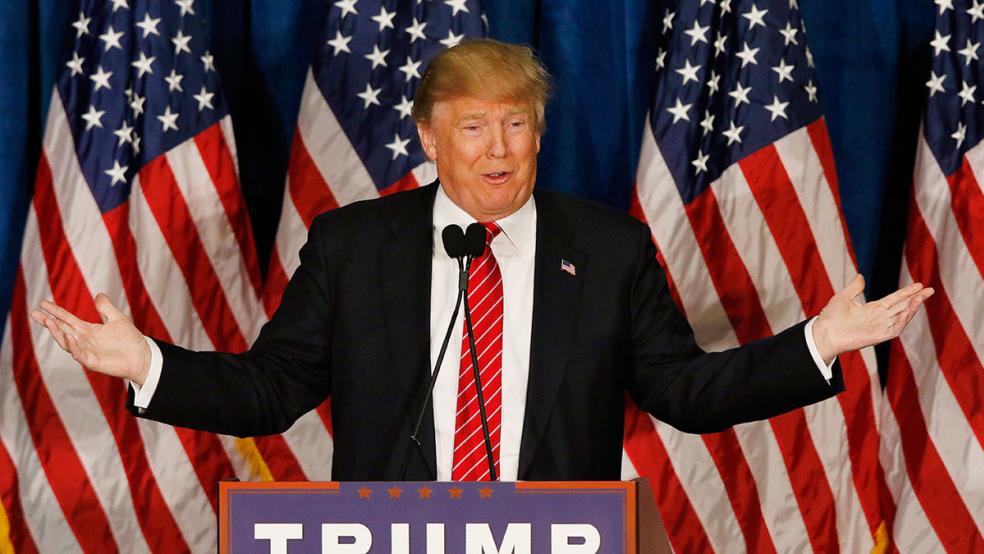Sen. Marco Rubio of Florida mocked billionaire Donald Trump at the last GOP presidential debate for failing miserably to explain his plans for repealing and replacing Obamacare, other than to encourage interstate competition among insurers to expand the availability of reasonably priced coverage.
Trump repeatedly summarized his health care initiative as getting rid of “the lines around the states” to bolster competition among health insurance companies. “That’s it?” Rubio replied, prompting laughter from the audience in Texas. "What is your plan, Mr. Trump?" Rubio asked. "What is your plan on healthcare?”
Related: Get Ready for a Two-Hour Food Fight at Tonight’s GOP Debate
Late Wednesday evening, Trump’s campaign posted a sketchy seven-point plan for revamping the government’s health care system that goes well beyond removing the lines. While there was little in the proposal that went beyond Republican conservative doctrine on health care reform, there was for the first time an element of coherence to what he said.
“It is not enough to simply repeal this terrible legislation,” Trump said in a document posted on his campaign website. “We will work with Congress to make sure we have a series of reforms ready for implementation that follow free market principles and that will restore economic freedom and certainty to everyone in this country. By following free market principles and working together to create sound public policy that will broaden healthcare access, make healthcare more affordable and improve the quality of the care available to all Americans.”
Among Trump’s suggestions:
- Allow individuals to fully deduct health insurance premiums from their tax returns under the current tax system, just as businesses have been able to deduct the cost of providing health care coverage to their workers.
- Allow individuals to use tax-free Health Savings Accounts to defray their expenses and to bequeath the accumulated savings to other members of their families without penalties.
Related: Could a Conservative Backlash Wipe Out Leading Republicans?
- Require price transparency from all doctors, hospitals and other health care providers to enable consumers to shop around for the best price for the treatment.
- Convert federal Medicaid coverage for the poor to block grants to the state and leave it to state officials to provide coverage and set the regulations. This is an idea that has been long promoted by House Speaker Paul Ryan (R-WI) and other congressional Republicans but has encountered stiff resistance from the Obama administration and congressional Democrats.
“Nearly every state already offers benefits beyond what is required in the current Medicaid structure,” Trump said in his statement. “The state governments know their people best and can manage the administration of Medicaid far better without federal overhead. States will have the incentives to seek out and eliminate fraud, waste and abuse to preserve our precious resources.”
Related: Many Senate Republicans Are Ready to Drop Trump ‘Like a Hot Rock’
- Lower drug prices by removing legal barriers to the importation of cheaper pharmaceuticals from Canada and other countries. This is an idea that has wide appeal across party lines, but has been vigorously opposed by the drug industry that argues that such a move would increase the prospects of unsafe drugs reaching U.S. consumers.
“Congress will need the courage to step away from the special interests and do what is right for America,” Trump said “Though the pharmaceutical industry is in the private sector, drug companies provide a public service. Allowing consumers access to imported, safe and dependable drugs from overseas will bring more options to consumers.” However, Trump was silent on the question of whether to end a legislative prohibition on Medicare, the health insurance program for the elderly, to negotiate with pharmaceutical companies for lower drug prices.
Trump has also repeatedly called for the Republicans to preserve one important feature of Obamacare – the prohibition on healthcare insurers denying coverage to someone because of a pre-existing medical condition. However, his stand on one of the most controversial provisions of the Affordable Care Act – the individual mandate requiring uninsured people to obtain coverage or pay a penalty – has been muddled at best. Health insurers convinced the Obama administration when drafting the legislation that that the individual mandate was essential to the profitability of the program if they were prohibited from rejecting applications from people with serious illnesses.
Democratic National Committee communications director Luis Miranda told Politico yesterday that Trump’s new plan was little more than a Republican ruse “to take health care away from millions of Americans without offering any substantive alternative.”
Related: Carson Quits, Giving Cruz a (Tiny) Bit of Good News
While Trump is now firmly embracing the Republicans’ long-standing cry to “repeal and replace” the Affordable Care Act because it is too costly and inefficient, he has occasionally stumbled badly over the healthcare issue.
Late last month, for instance, Trump told CNN's Anderson Cooper that he likes the healthcare law's requirement to have health coverage. But when his opponents complained, the Republican frontrunner tweeted the following day that he would in fact repeal it, along with the rest of President Obama's healthcare law.
Sen. Ted Cruz of Texas, another Republican presidential contender, has also criticized Trump for suggesting in the past that he might support a “single-payer” health care system, like the ones in Canada and Europe that many conservatives deride as socialized medicine.





